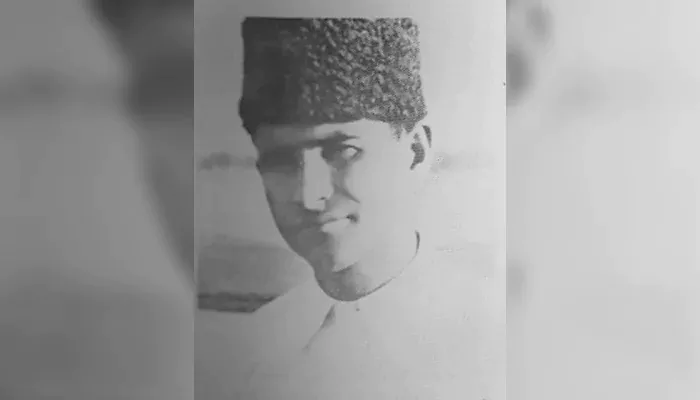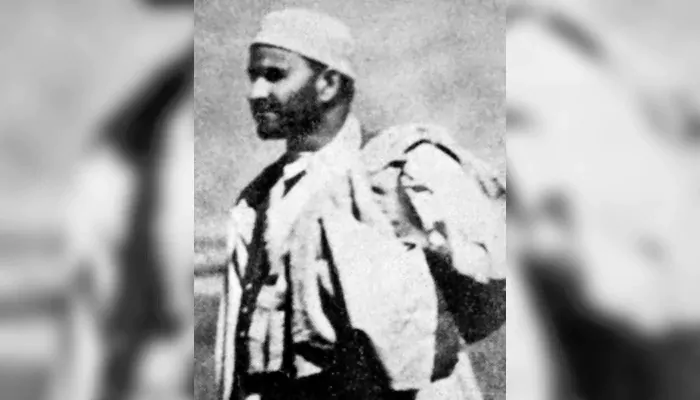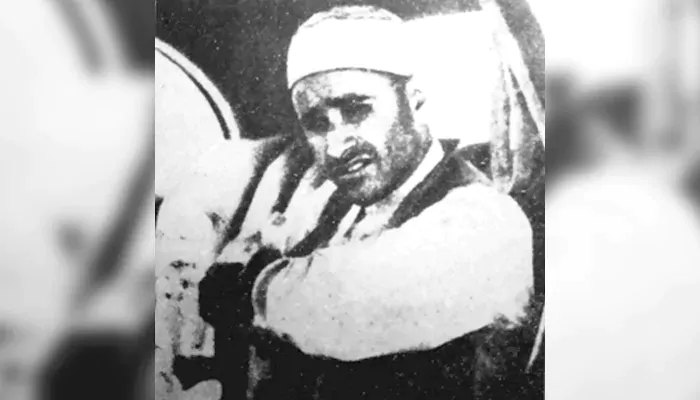
Long before the Avengers of the MCU, Bhagat Ram Talwar said, "WHATEVER IT TAKES!"
We all grew up hearing the same few names from India’s freedom movement. However, the fight for independence was much bigger, with unsung heroes who risked everything and never made it to the limelight. One such man was Bhagat Ram Talwar, whose story sounds straight out of a Bollywood spy thriller, except it’s all true. During World War II, he became a Nazi spy to fight the British. He moved through borders with false identities, fed secrets to multiple powers, and played a dangerous double game, all for India’s freedom.
As the nation gears up to celebrate its 79th Independence Day, let's learn the tale of the only Indian who spied for Nazi Germany, against the British Raj.
Born in 1908 in Ghalla Dher, a village in the North-West Frontier Province (now in Pakistan), Talwar belonged to a Punjabi Hindu Pathan family steeped in political resistance. His father, once a supporter of the British, turned against them after the 1919 Jallianwala Bagh massacre. The family's spirit of defiance was most deeply embodied by Talwar’s elder brother, Hari Kishan Talwar, who was hanged in 1931 for trying to assassinate the British Governor of Punjab, Sir Geoffrey de Montmorency. That personal loss left a mark that would shape Bhagat Ram Talwar’s life.
Gurdas Mal Talwar
— Khatri Heritage (@Khatrirajaporus) September 7, 2024
Father of freedom fighters Bhagat Ram Talwar and Hari Kishan Talwar pic.twitter.com/LWX6ccOEYw
(Credit: Khatri Heritage)
He soon joined revolutionary circles, including the Naujawan Bharat Sabha, inspired by Bhagat Singh, and later became active in the Kirti Kisan Party, which had roots in the Ghadar movement and leaned strongly left. The seeds of rebellion had taken firm root, and Talwar would go on to fight the empire not with a gun, but with secrets.
Talwar’s life took a historic turn in January 1941. Netaji Subhas Chandra Bose was under house arrest in Calcutta and planning a daring escape to seek support for India’s liberation. The Kirti Kisan Party chose Talwar to escort him safely across the border into Afghanistan.
Disguised as a deaf and mute Pathan, Talwar guided Bose through a treacherous 200-mile journey from Peshawar to Kabul, dodging British surveillance along the way. He let his beard grow, dressed like the locals, and blended into the tribal terrain. “He posed as a deaf and dumb tribesman,” writes historian Mihir Bose in 'The Indian Spy: The True Story of the Most Remarkable Secret Agent of World War II'. It was a mission that required nerve, disguise, and absolute trust, and Bose made it to Kabul safely. From there, he eventually travelled to Moscow and then Berlin.
A little aside on Subhas Bose’s great escape this day in 1941. His helper in Kabul, Bhagat Ram Talwar, eventually betrayed him. Talwar passed on Bose’s secrets to his handler in British intelligence. Peter Fleming, the elder brother of Ian Fleming – the creator of James Bond. pic.twitter.com/GE7PLHRdsQ
— Anuj Dhar (@anujdhar) January 16, 2019
(Credit: Anuj Dhar)
But what Bose didn’t know was that his trusted companion had already started walking a very different, very dangerous path.
Once in Kabul, Bose introduced Talwar (now going by the alias Rahmat Khan) to the Axis diplomats as a potential ally in their efforts to destabilize the British Empire. The Italians were the first to enlist him. Then came Nazi Germany. Soon after, Talwar was also working with the Japanese. Each power believed they had found a loyal Indian operative working for their cause.
The Germans were particularly impressed. They trained him in the craft of espionage, rewarded him with the prestigious Iron Cross, and handed him what would today be worth over £2.5 million. But none of them realized Talwar had no love for fascism, as his heart was firmly with India’s freedom and his ideology with communism.
That same year, after Nazi Germany turned against the Soviet Union, Talwar approached the Soviet NKVD in Kabul and began passing intelligence to them. This made him a triple agent. Eventually, the Soviets helped him connect with British intelligence, who, ironically, brought him under their fold as a secret operative codenamed “Silver.”
Talwar was now spying for five nations, each convinced he was working for them. The British even assigned him a handler: Peter Fleming, elder brother of James Bond creator Ian Fleming. Operating from Delhi, Fleming fed Talwar disinformation to confuse the Axis, but little did he know, Talwar was twisting the game from both ends.
Bhagat Ram Talwar
— Khatri Heritage (@Khatrirajaporus) September 7, 2024
The Quintuple Agent Who Fooled Empires During WWII pic.twitter.com/WVUip8iHjO
(Credit: Khatri Heritage)
“Talwar was a genius of manipulation,” Mihir Bose notes, adding, “He kept all sides guessing and never gave away the full truth to any of them.” Over the course of the war, Talwar made at least 24 trips between Peshawar and Kabul, each time risking capture, torture, or death.
Despite the tangled web of lies and loyalties, Talwar’s mission was clear to him: weaken the British Empire by any means necessary. Like Netaji Subhas Chandra Bose, he believed in the principle of “my enemy’s enemy is my friend.” But he took it even further by playing enemies against one another while keeping India’s freedom as his north star.
To the Germans, he fed false intelligence about uprisings in the tribal belts. To the British, he passed filtered Axis plans. According to historian Milan Hauner, Talwar’s misinformation campaign may have helped the British avoid real insurgencies in India’s frontier regions, a paradox that underlines the complexity of his strategy.
But not everything he did was easy to justify. Perhaps the most controversial part of his story is that while escorting Bose to Kabul, Talwar secretly shared Bose’s movements with the British. Bose, unaware of the betrayal, continued to trust him even while receiving fake reports later through him in Berlin.

“Talwar led Bose by the nose to glory, like a hapless Afghan sacrificial lamb,” wrote investigative journalist Josy Joseph in The Hindu. To Talwar, the deception was painful but necessary. In his eyes, the British were the main enemy, and weakening them required using every pawn on the board, including a fellow revolutionary.
When the war ended in 1945, so did Talwar’s career in espionage. He collected his final British payment and disappeared into the North-West Frontier. After India’s independence and the violent chaos of Partition, he resurfaced in Uttar Pradesh, where he lived until his death in 1983.
For decades, almost no one knew the full extent of his double (or rather, quintuple) life. He briefly broke his silence in 1973 at a Netaji seminar in Calcutta, where he praised Bose but didn’t mention his betrayal. Even his 1976 autobiography, 'The Talwars of Pathan Land', published by the Communist Party of India, skirted around his wartime role.

So, why was he forgotten? Part of the reason lies in how we tell history. “World War II history is often shaped by national pride,” Mihir Bose explains. “For the British, Talwar’s role complicates the narrative of their intelligence victories. In India, his story doesn’t fit into the Gandhian model of non-violent struggle.” His communist ties may have further distanced him from the mainstream nationalist discourse.
Bhagat Ram Talwar’s story reminds us that India’s freedom wasn’t won by one path alone. Not every hero marched peacefully or led protests. Some, like Talwar, worked in the shadows and risked everything, including their morals.
A British official once described him as “unattractive of appearance,” and his education was limited. Yet he ran rings around powerful intelligence agencies during one of the most dangerous times in history. “Talwar could deceive anyone,” Mihir Bose writes, “but remained loyal only to the Communist Party of India.”
His life, pieced together from British, Soviet, Indian, and Italian archives, complicates the clean-cut image of India’s independence struggle. It shows us that history isn’t just about idealism but also about hard choices.
“Talwar’s life interrupts the Gandhi-centric portrayal of India’s struggle,” says historian Romain Hayes, “showing the moral ambiguities of those who chose unconventional paths.”
In the end, Bhagat Ram Talwar remains an enigma who served many masters but one mission. His name may never be as well-known as Netaji’s, but his contribution was no less daring.